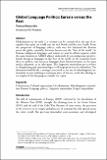Global language politics : Eurasia versus the Rest
Abstract
Globalization in the early 21st century can be considered as the age of inequality that splits the world into the rich North and the poor South. From the perspective of language politics, only very few discussed the division across the globe, especially, between Eurasia and the “Rest of the world.” In Eurasia, indigenous languages and scripts are used in official capacity, while the same function is fulfilled almost exclusively by non-indigenous (post/colonial) European languages in the Rest of the world. In the countries where they are spoken, non-Eurasian languages have limited presence in the mass media, education, or in cyberspace. This linguistic imperialism par excellence is a long-lasting and pernicious legacy of European (western) colonialism. The aforementioned divide is strongly associated to the use of ethnolinguistic nationalism in state building across many areas of Eurasia, while this ideology is not employed for this purpose outside the region.
Citation
Kamusella , T 2020 , ' Global language politics : Eurasia versus the Rest ' , Journal of Nationalism, Memory and Language Politics , vol. 14 , no. 2 , pp. 117-151 . https://doi.org/10.2478/jnmlp-2020-0008
Publication
Journal of Nationalism, Memory and Language Politics
Status
Peer reviewed
ISSN
2570-5857Type
Journal article
Collections
Items in the St Andrews Research Repository are protected by copyright, with all rights reserved, unless otherwise indicated.

